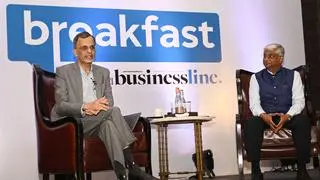Ahead of the second round of regulations related to EU’s Carbon Border Adjustment Mechanism (CBAM) coming in, Indian officials are reportedly discussing two probable alternatives, which will factor in the carbon tax to ensure that exports are not hit. The first option officials are discussing suggest that an amount equivalent to the levied carbon tax on exports from India be negotiated and factored into the final price of a finished product (using the said exported item) coming in from European Union nations, or on some items of similar nature.
For example, if steel is being exported to EU after paying carbon tax of $100 per tonne, then price negotiations must be done to have another $100 per tonne added to another item coming in from the EU. Officials told businessline that “this is not a countervailing tax on EU”, but will be price negotiations to see that “tax collected from Indian companies be brought back to the country”.
The second option that is being put on the table is the repatriation of the amount collected as carbon tax. “Repatriation will enable India to take care of its climate mitigation requirements and goals,” said an official. Two of the sectors that are expected to be hit the most with the upcoming carbon tax include iron and steel and aluminium exports. Others sectors where CBAM reporting is being mandated include cement, hydrogen, electricity and fertilisers.
The CBAM entered its transitional phase on October 1 and steel and aluminium exports will be worst hit categories as and when the carbon tax gets implemented. At present, exporters will need to mention the carbon content in their product, and shipments will then be checked against the “default value range”, which are mentioned in the EU’s charter or export list to determine if the carbon emissions are within a particular range or not.
CBAM gets into a taxation phase January 2026 onwards.
Discussions on
According to officials, a recent meeting was held with industry stakeholders and a key ministry overseeing some of the CBAM impacts. There the stakeholders had sought of getting “competitive advantage” in the sense that the carbon tax paid during export of the commodity.
Post carbon tax coming in, the aluminium sector is anticipating a two-five per cent impact on prices (at existing LME), which they say is a “big impact”. “So, some of the companies and associations are saying that price negotiations be carried out and the carbon tax paid be factored in for goods coming in. Some companies said that repatriation be company specific that is the carbon tax paid by them be returned to them at the time of imports by them from EU,” the official explained.
Incidentally, officials across ministries are in favour of the EU repatriating any carbon tax – as and when it comes into effect – being collected from Indian exporters. Price renegotiations on imports, officials say, can be seen as a “countervailing tax” and may come under WTO’s legal framework.








Comments
Comments have to be in English, and in full sentences. They cannot be abusive or personal. Please abide by our community guidelines for posting your comments.
We have migrated to a new commenting platform. If you are already a registered user of TheHindu Businessline and logged in, you may continue to engage with our articles. If you do not have an account please register and login to post comments. Users can access their older comments by logging into their accounts on Vuukle.